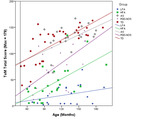Empathy and social cognition in autism
 Image credit: rawpixel.com
Image credit: rawpixel.comMy postgraduate work looked at empathy and social cognition (how we think about other’s thoughts, desires and behaviors). In particular, I looked at how these skills develop and present in autism spectrum disorder. To measure empathy, I used self-report measures, cognitive tests, and physiological measures such as heart rate variability, muscle mimicry and skin conductance.
Using hierarchical modelling and factor analysis, I showed that individuals with autism have deficits in alexithymia (understanding and labelling your own emotions) and cognitive empathy (understanding others’ emotions and thoughts), but not affective empathy (feeling emotion based on others’ emotions). The research contributes to the ongoing discussion on how to move from categorical classification of mental disorders to describing psychophysiological pathways associated with clinical traits, as recommended by the NIMH Research Domain Criteria .
I’ve also investigated whether social cognition skills, or theory of mind, can indicate autism spectrum disorder severity in children. The study found three distinct clusters of theory of mind ability: early-developing theory of mind, the ability to understand that others can hold beliefs about the world that are false (false-belief reasoning), and sophisticated theory of mind understanding. The clusters corresponded to disorder severity level and reliably predicted the type of school children attended.
I have published articles from my work in Autism, Research in Autism Spectrum Disorders and the Journal of Child and Adolescent Mental Health. The research has been presented at over 20 national and international conferences, won an award for best poster at the International Association for the Scientific Study of Intellectual and Developmental Disabilities , and received grants from the National Research Foundation (South Africa) , the German Academic Exchange Service (DAAD) and the AW Mellow Foundation .

